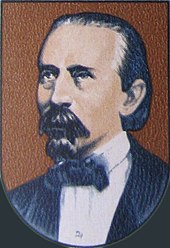Alexandru braid maker
Alexandru Adolf Flechtenmacher (born December 23, 1823 in Iași , † January 28, 1898 in Bucharest ) was a Romanian composer , violinist, conductor and teacher.
Life
Flechtenmacher was the eldest son of from Bartholomew coming Transylvanian Saxon lawyer Christian Flechtenmacher (* September 25, 1785, † May 13, 1843) and its from Sibiu originating wife, the pianist Johanna Wollenbär (1795-1856), born in Iasi, the was then the capital of the Principality of Moldova . At the age of fourteen he went to Austria , where he was trained for four years at the Vienna Conservatory. He returned to his home country and was appointed professor of violin and cello in Bucharest, founded and led by the Russian archimandrite Bessarion. At the beginning of the revolution, Flechtenmacher already had a name in the Romanian theater world at the age of 17 - immediately after his return from Vienna he was employed as a violinist in the orchestra of the National Theater in Iași. In 1852 he got the same job in Bucharest, but soon left the theater in Craiova , where he presented himself as a conductor, primarily with his own music. After five years in Oltenia , Flechtenmacher had been a violinist and director of the National Theater Orchestra for two decades. In love with the theater, the artist has created over 50 works for the stage with texts by Vasile Alecsandri , “Costache” Negruzzi , Dimitrie Bolintineanu , Alecv Russo , Matei Millo and many others.
From November 1, 1864, when he was almost 21 years old, Alexander Flechtenmacher was director of the Conservatorul de Muzică și Declamațiune in Bucharest, an institution that later became the National Music University of Bucharest .
In addition to symphonic and choral music , he mainly composed the operetta “Baba Harca” with a libretto by Matei Millo, the first of its kind in Romania. The premiere took place in December 1848 in Iași, where the cast was praised and extensively received in the newspapers. All lyrics of the songs "Ursul negru si alb", "Un trantor cat zece", "Cersetorul orb" and "Apele de la Vacaresti" were written by Matei Millo. Flechtenmacher composed music for plays such as “Coana Chirita in Iași sau doua fete si-o neneaca”, “Conu Iorgu de la Sadagura” and others by Vasile Alecsandri. He is the founder of a variety theater.
The composition of secular and religious choral works occupies a special place in his oeuvre . He wrote “Sfanta zi de libertate” (transl .: “Holy Day of Freedom”), for choir and piano accompaniment (text: Eugeniu Carada ), “Imnul moldovenilor” (text: Dimitrie Gusti ), “ Hora Unirii ” for choir and piano accompaniment (Text by Vasile Alecsandri) and many more. A good part of his religious works of great importance in the Christian Orthodox churches, which were celebrated on official occasions and Christian holidays.
Alexander Flechtenmacher gained a reputation in the history of music as a leading advocate of secular and religious Romanian choral music. He realized his personal dream, in which folkloric motifs of traditional Romanian songs and games can be in perfect harmony with symphony and instrumental music.
Works
Selection of important works by Flechtenmacher:
- Baba Hârca (The witch Hârca; libretto: Matei Millo ), operetta in 2 acts, (first performed in Jassy in 1848)
- Doi ţărani şi cinci cârlani (Two farmers and five goats; Constantin Negruzzi ), Vaudeville , (1848 in Jassy)
- Barbu Lăutarul (Barbu the minstrel; Vasile Alecsandri ), stage kanzonette 1850; (1854 in Jassy)
- Scara mâţei (The Catwalk; V. Alecsandri ); Vaudeville 1850 (in Jassy)
- Coana Chiriţa sau două fete şi-o neneacă (Coana Chiriţa or Two Girls and a Auntie; V. Alecsandri ), (Vaudeville)
- Întoarcerea Coanei Chiriţa sau Coana Chiriţa în provincie (return of the Coana Chiriţa or Coana Chiriţa in the province; V. Alecsandri ), Vaudeville (1850 in Jassy)
- Banii, Gloria şi Amorul (Money, Fame and Love; Eugeniu Carada ), Vaudeville (1861 in Bucharest)
- Răzvan şi Vidra Bogdan Petriceicu Hasdeu , historical drama in 5 acts (1867 in Bucharest)
- Fata de la Cozia (The Girl from Cozia; Dimitrie Bolintineanu ), opera in 3 acts (1870; unfinished)
Appreciation
Alexander Flechtenmacher died at the age of 75 and left an important cultural legacy. The city of Iași pays the artist an hourly tribute by replicating “Hora Unirii” every hour on the hour with a carillon consisting of eight bells.
literature
- Valentina Sandu-Dediu, Rodica Oană-Pop: Braid maker, Alexandru. In: Ludwig Finscher (Hrsg.): The music in past and present . Second edition, personal section, volume 5 (Covell - Dzurov). Bärenreiter / Metzler, Kassel et al. 2001, ISBN 3-7618-1115-2 ( online edition , subscription required for full access)
- Antigona Rădulescu: braid maker, Alexandru. In: Grove Music Online (English; subscription required).
Individual evidence
- ↑ a b List of the stage works by Alexandru Flechtenmacher based on the MGG in Operone
- ↑ Alexandru Flechtenmacher ( Memento from March 4, 2016 in the Internet Archive )
- ↑ a b c d National Magazine ( Memento from March 4, 2016 in the Internet Archive ), 2011
| personal data | |
|---|---|
| SURNAME | Braid maker, Alexandru |
| ALTERNATIVE NAMES | Lichenmacher, Alexandru Adolf (full name) |
| BRIEF DESCRIPTION | Romanian composer, violinist, conductor and teacher in Moldova |
| DATE OF BIRTH | December 23, 1823 |
| PLACE OF BIRTH | Iași |
| DATE OF DEATH | January 28, 1898 |
| Place of death | Bucharest |
